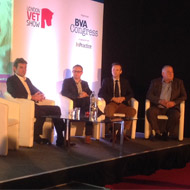What price pet health?

There was overwhelming endorsement from delegates for a more collaborative effort between the pet insurance industry, veterinary practices and its client 'customers'.
There was animated debate at the BVA Congress this morning on different perspectives of pet insurance.
At the moment, only 25 per cent of companion animals in the UK are insured. Better collaboration between practices and insurers will play a significant role in increasing this number, and an acknowledgment that most clients simply want premiums at the right price for the insurance services that they actually want.
There is a general lack of awareness of the overall costs of keeping a pet across its entire life span, especially with respect to veterinary care. So the affordability of pet insurance is a key factor in client choice. There is also evidence that some clients are confused by the range of choice and constraints of over 95 different available policies.
'Selling' insurance is still an anathema to the majority of vets, although more and more practices are including it as part of 'healthcare plans' for their clients. Much of the reluctance of vets to promote pet insurance relates to their confusion over what policies cover and the occasions when the level of insurance does not meet client or practice expectations.
There are data to show that pet insurance uptake is not directly related to client social demographics, but rather to their level of "economic literacy" and their understanding of how insurance works. It is essential, however, that the optimum welfare of pet animals is not compromised because owners are unable to afford appropriate insurance cover.
Pet insurance is an essential factor in maintaining the future buoyancy of the veterinary industry and there are examples of ways forward that can be gleaned from human healthcare models.
In a show of hands, there was overwhelming endorsement from delegates for a more collaborative effort between the pet insurance industry, veterinary practices and its client 'customers'. The only way forward is to recognise the rapidly evolving advances in digital data collection and in clinical practice, and for practices to adopt a more flexible proactive approach.



 The latest
The latest